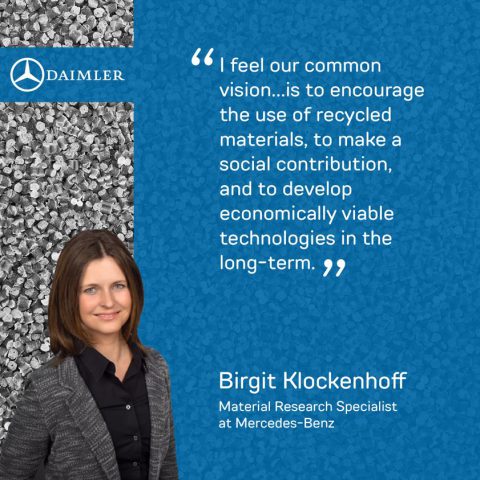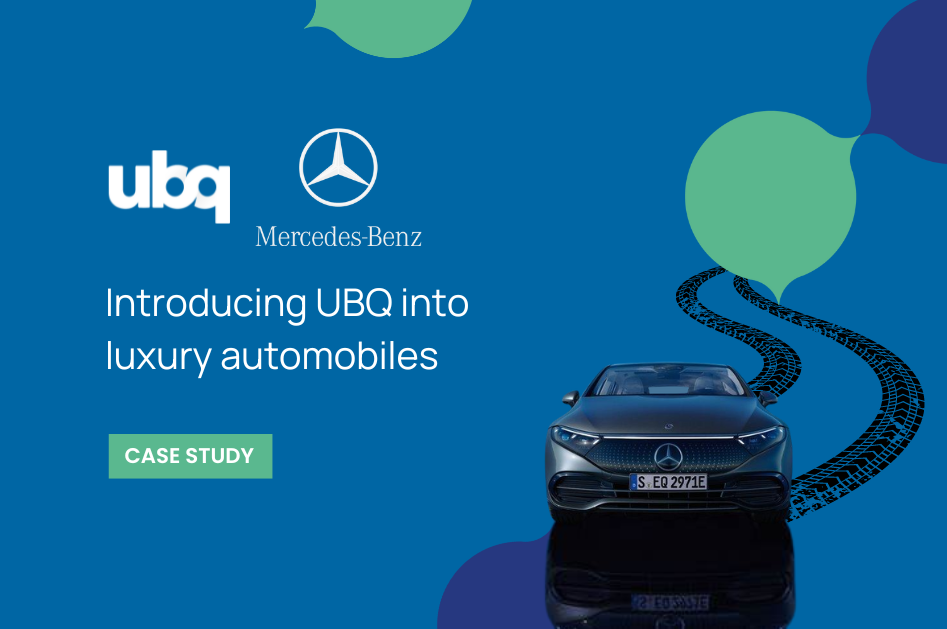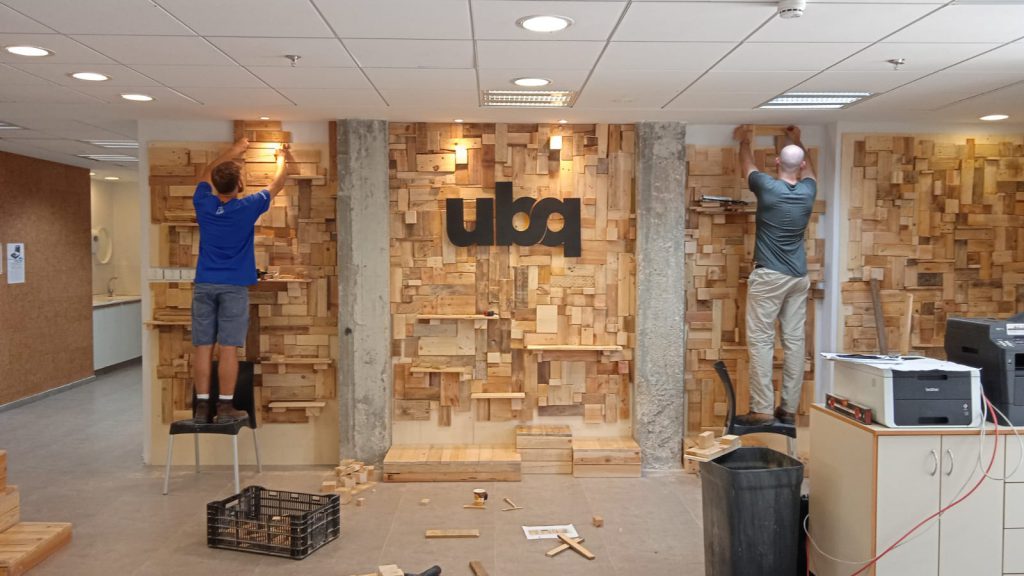Paris, March 2019: Birgit Klockenhoff, material research specialist, and Torsten Harms, heads of the lightweight construction team at Mercedes-Benz’ Hamburg plant, are first introduced to UBQ Materials at JEC World, an international trade fair for composite materials. They’re hooked and agree they want to test its new material.
Stuttgart, July 2019: Klockenhoff and UBQ Materials’ Sophie Tuviahu make a pitch as part of Mercedes-Benz “Startup Autobahn” innovation platform, where start-up innovations are tested, evaluated, rapidly implemented, and presented to a broad audience.
January 2020: Automotive giant Mercedes-Benz, parent company of Mercedes-Benz, announces it will test UBQ™ in the production of automobile parts.
Why Mercedes-Benz Group Research Chose UBQ as a Partner
For Klockenhoff, teaming up with UBQ seemed a natural fit. “I feel our common vision…is to encourage the use of recycled materials, to make a social contribution, and to develop economically viable technologies in the long term,” she says. And UBQ’s focus on a sustainable, circular economy fit perfectly into Mercedes-Benz’ own sustainable business strategy.
Working together, the manufacturer of bio-based plastic alternatives and the multinational automotive corporation aim to partially replace traditional materials such as polypropylene with UBQ’s climate-positive thermoplastic.
The Challenge
The team at Mercedes-Benz Group Research doesn’t expect a new technology to be at its highest level of development when it comes to them. Klockenhoff says the aim is to solve technical problems during an evaluation process and get to a place where they’re testing practical applications and envisioning which partners they might work with in supporting the offsetting of Mercedes-Benz carbon footprint across its supply chain.
Insights
Mercedes-Benz sustainable business strategy envisions reducing fleet consumption through lightweight construction. To that end, the company launched a pilot project to develop a sustainable cargo bay. Anton Kempel, calculation engineer for process simulation in lightweight construction, says at first they were laughed at for believing “banana peels and baby diapers” could be used as feedstock and that the material would withstand industry requirements. He admits, though, his team was surprised that the components really worked as they expected.
Development engineer Holger Kittler sees UBQ assisting Mercedes-Benz in moving step by step towards CO2-neutral production. Torsten Harms, who with his 15-member team promotes lightweight construction projects, says UBQ offers another positive environmental effect: the material comes from a mixed mountain of rubbish that, if sent to landfills, would result in a higher-level production of methane gas, which has a drastically higher global warming effect than CO2.
Harms and his team successfully tested UBQ™ under different conditions and the plastics experts now plan to use UBQ™ for new developments, a first in automotive parts manufacturing. The material has also been tested by processes and materials engineering manager, Dr. Frank Hirlinger, who set out to find how the UBQ™ material behaved under a wide variety of conditions, including extreme heat. UBQ™ has successfully passed the “heat test”, while moisture tests are expected to continue until the end of 2020. There’s also a media test, during which the material comes in contact with automotive fluids such as paint or engine cleaner.
These tests will continue into 2021 and Hirlinger says, if successful, he foresees a scenario where 25 percent of the plastics used in each vehicle will consist of recycled materials. As he points out, the company is already using a number of recycled plastics without anyone seeing or noticing. The greatest technical challenge, he says, is that bio-based materials should not be inferior to or more expensive than conventional ones. He believes UBQ Materials scores particularly well with respect to cost-effectiveness, even when compared to conventional polypropylene.
The Solution: Promoting a Circular Economy
Mercedes-Benz believes bio-based UBQ™ material is a promising contributor to a climate-neutral, sustainable world. Looking ahead, says Klockenhoff, the lightweight bio-based thermoplastic could be used by its commercial vehicles arm in the production of bus bumpers, load carrier boxes, and cable ducts. With its research on this new resource, the auto manufacturer is taking a further step towards a sustainable circular economy.
Klockenhoff is also excited to hear testers say it’s possible Mercedes-Benz might not have to limit the use of UBQ™ to auto parts alone. That possibility is a dream come true for UBQ’s CEO Tato Bigio who’s always aspired to having the UBQ™ material used in a Mercedes-Benz vehicle. It’s also fitting for the company as a whole, because turning sustainability dreams into reality has been its vision from the start.



